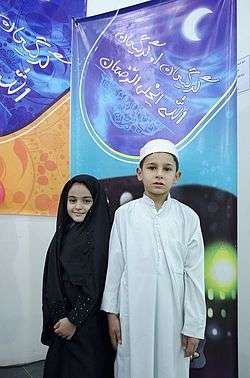Gargee'an

Qarqe'an (Arabic: قرقيعان, sometimes spelled as Gerga'oon or Girgian) is a biannual celebration, observed primarily in Eastern Arabia (Arab states of the Persian Gulf), that takes place on the 15th night of the Islamic month of Sha'ban and on the 15th night of Ramadan. Gerga'oon is marked with children dressing in traditional attire and going door-to-door to receive sweets and nuts from neighbours, whilst also singing traditional songs. The tradition has existed for hundreds of years and deeply rooted in Gulf culture.[1]
Although the celebration of Qarqe'an shares superficial similarities with the Halloween custom of trick-or-treating, practiced in some western countries, Qarqe'an has no connection with horror and no associated origin with Halloween.
Etymology
The exact origin of the word Qarqe'an is unknown though several theories exist; One such theory states that it is derived from Qarqa'ah (Arabic: قرقعة), which means click or snick, the sound of iron pots carrying the sweets hitting each other while serving the sweets.[1] Another theory says that it could originate from the kids of Medina singing "Qarrat Al Ain, Qarrat Al Ain" which was changed with time to Qarqe'an.
Religious significance
Both Gerga'oon nights are significant to both Sunni and Shia Muslims. Gerga'oon on the 15th of Sha'ban marks the birthday of Imam Muhammad al-Mahdi, the 12th Imam.[2] Gerga'oon on the 15th of Ramadan coincides with the birth of Imam Hasan ibn Ali, the second Imam in Shia Islam. As a result, the occasion is seen as a time of happiness and festivities by Shia Muslims, particularly in Bahrain.[3] Events during the night include religious sermons conducted by mosques, carnival-like attractions in much of the capital cities of the Gulf, such as in Manama and Doha.[3]
Background
The origin of this act goes back to the birth of Prophet Muhammad's grandson, Hasan ibn Ali when the Prophet's daughter Fatimah gave out colored sugar cubes to the people in celebration of her new born child on the 15th of Ramadan. When the kids of Medina heard about the news of the birth, they gathered around the prophet's house singing "Qarrat Al Ain, Qarrat Al Ain Wa Ajr AlJo'an" which means "Congratulations, congratulations, blessed for feeding the hungry." The prophet rewarded them with sweets, dates and raisins.
Tradition
Children gather in small choir groups in front of a home and sing. The song is intended to call on Allah to bless the youngest child of the family, to keep him or her healthy that the mother will remain happy. The more they sing, the more nuts and sweets they receive. The Qarqe'an tradition is intended to spread love, happiness and affection among adults and children.
In modern times, supermarkets, corporates, and malls compete to attract children during this time via advertising in newspapers and on TV, and by offering special promotions and arranging closed Qarqe'an events to market themselves.[4]
See also
References
- 1 2 "القرقاعون من أهم الاحتفالات الرمضانية الشعبية في مملكة البحرين". Bahrain News Agency. 2 August 2012. Retrieved 3 February 2013.
- ↑ ""نسائية سار الرياضي" تقيم مهرجان القرقاعون الأول". Al Wasat. 15 August 2008. Retrieved 4 February 2013.
- 1 2 "القرقاعون: البحرين تحيي ليلة النصف من رمضان". Al Wasat. 20 November 2002. Retrieved 3 February 2013.
- ↑ ""البحرين سيتي سنتر" يحتفل بليلة القرقاعون مساء اليوم". Al Ayam. 31 July 2012. Retrieved 3 February 2013.